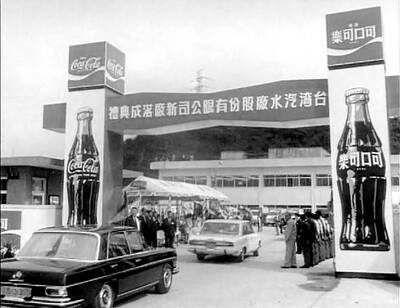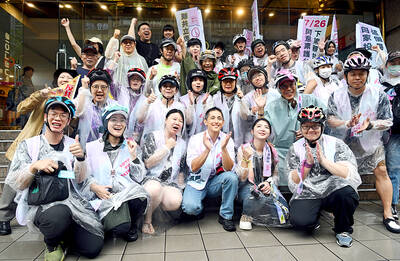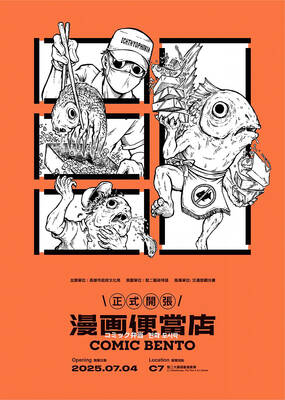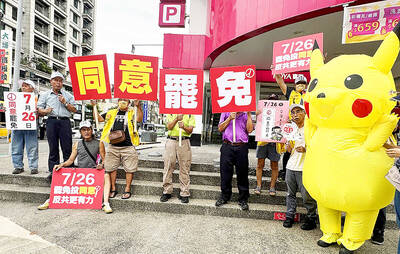Tree Cafe is a truly multicultural restaurant that draws on the skills of the traditional cuisines of various artists that frequent the area. With its motto: "0 People, 10 Countries, 10 Cuisines," it has been promoting good food and cultural harmony in the neighborhood for over six years.
This small brick restaurant is nestled in the heart of the Dream Community, a local organization dedicated to the spread of art appreciation and cultural exchanges in Taiwan. Festivals and other events occur here throughout the year, aided by an international artist exchange program.
The Tree Cafe was founded in 1999 by the restaurant manager Amy Tsai. Many of the artists who come to Taiwan borrow the Tree Cafe's kitchen to cook specialties from their native countries, adding their own distinctive flavors to the menu. The result is one of the most diverse selections of international dishes in Taipei.

PHOTO: SEAN LIN, TAIPEI TIMES
The Tree Cafe is built to feel like a homely European coffee shop, where patrons can come for a hot meal and a talk with friends after a long day in the city.
Charles and Deep, waiters from Nigeria and Nepal, warmly welcome you as you enter the restaurant. The cafe hires no professional chefs, instead relying on old-fashioned home cooking. Before ordering, be sure to take a look at the back of the menu, where the 10 international cooks are introduced along with recipes for some of the dishes.
The buttery vegetable soup that preceded our meal tasted fresh with its juicy bell peppers and carrots. The accompanying olive focaccia had an aromatic flavor and genuine crusty texture that is nearly impossible to find in Taiwanese bakeries. The Nigerian pork fillet, recommended by Charles, was a little overcooked but infused with a delicious spiced tomato flavor. The marinated Tandoori salmon, Deep's recommendation, was tender, juicy and packed with the flavor of spices and creamy butter. The zesty Marseille spicy seafood spaghetti and the creamy Alaskan smoked salmon spaghetti are highly recommended and good value.
The Tree Cafe's fruit tarts provided a light, refreshing end to the meal. In the past, the bakers used canned and imported fruits from the artists' home countries. However, they found that using locally grown fruit could retain the natural freshness of the dishes. Various breads are also for sale at the cafe counter, made freshly from the community's nearby bakery. The red wine bread we bought was so enticing that we ate one loaf as soon as we stepped out of the restaurant.

July 28 to Aug. 3 Former president Chiang Kai-shek (蔣介石) reportedly maintained a simple diet and preferred to drink warm water — but one indulgence he enjoyed was a banned drink: Coca-Cola. Although a Coca-Cola plant was built in Taiwan in 1957, It was only allowed to sell to the US military and other American agencies. However, Chiang’s aides recall procuring the soft drink at US military exchange stores, and there’s also records of the Presidential Office ordering in bulk from Hong Kong. By the 1960s, it wasn’t difficult for those with means or connections to obtain Coca-Cola from the

Taiwan is today going to participate in a world-first experiment in democracy. Twenty-four Chinese Nationalist Party (KMT) lawmakers will face a recall vote, with the results determining if they keep their jobs. Some recalls look safe for the incumbents, other lawmakers appear heading for a fall and many could go either way. Predictions on the outcome vary widely, which is unsurprising — this is the first time worldwide a mass recall has ever been attempted at the national level. Even meteorologists are unclear what will happen. As this paper reported, the interactions between tropical storms Francisco and Com-May could lead to

It looks like a restaurant — but it’s food for the mind. Kaohsiung’s Pier-2 Art Center is currently hosting Comic Bento (漫畫便當店), an immersive and quirky exhibition that spotlights Taiwanese comic and animation artists. The entire show is designed like a playful bento shop, where books, plushies and installations are laid out like food offerings — with a much deeper cultural bite. Visitors first enter what looks like a self-service restaurant. Comics, toys and merchandise are displayed buffet-style in trays typically used for lunch servings. Posters on the walls present each comic as a nutritional label for the stories and an ingredient

Fundamentally, this Saturday’s recall vote on 24 Chinese Nationalist Party (KMT) lawmakers is a democratic battle of wills between hardcore supporters of Taiwan sovereignty and the KMT incumbents’ core supporters. The recall campaigners have a key asset: clarity of purpose. Stripped to the core, their mission is to defend Taiwan’s sovereignty and democracy from the Chinese Communist Party (CCP). They understand a basic truth, the CCP is — in their own words — at war with Taiwan and Western democracies. Their “unrestricted warfare” campaign to undermine and destroy Taiwan from within is explicit, while simultaneously conducting rehearsals almost daily for invasion,